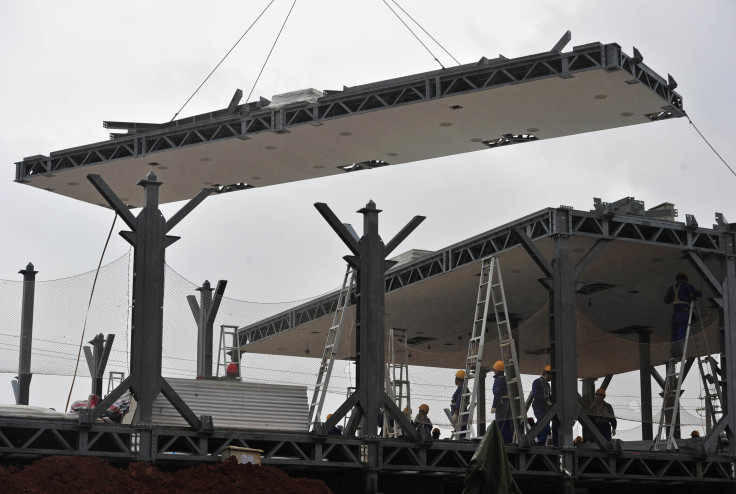Chinese Real Estate's New Frontier Is US

Following the lead of wealthy Chinese individuals, who have been pouring money into U.S. real estate, and state-owned Chinese banks, which have sharply increased lending to U.S. commercial properties, it is now the turn of Chinese property developers to try their luck in the U.S., the Financial Times reports.
With Beijing pushing to restrain housing prices – most recently unveiling a tougher real estate capital gains tax in March – the pressure is on for China’s property developers to seek opportunities overseas.
A report issued Tuesday by China Merchants Bank and the consulting firm Bain & Co. in China reflects uncertainties about abrupt shifts in an economy in which growth slowed last year to 7.8 percent from the past decade’s double-digit rates, the AP reports.
Beijing is trying to shift the basis of growth to domestic consumption and services, reducing reliance on exports and construction that made fortunes for earlier entrepreneurs. Communist leaders have pledged to use taxes and social spending to narrow the huge and politically sensitive gulf between China’s small elite and its poor majority.
Investor attitudes are being influenced by “the political environment and possible changes in tax policy,” said Chen Kunde, director of China Merchants’ wealth management business. They are “switching their focus from deriving more profits to protecting their existing wealth.”
China Merchants and Bain caused a stir in 2009 when they reported 60 percent of wealthy Chinese had completed or were considering “investment immigration” — temporary or permanent residency given by some countries to attract investors.
They said they found similar levels of interest in such immigration this year and added that more than 10 percent of people surveyed expect their children to also pursue it.
Xinyuan Real Estate is among the companies leading the charge in the U.S. market, the Financial Times reports.
The U.S.-listed Chinese developer, which counts billionaire Sam Zell among its early backers, made the news last September when it snapped up the Brooklyn site of an abandoned development project for $54.2 million. John Liang, head of the firm’s U.S. operations, says the company plans to spend about another $150 million on the development.
“We are just going where our customers are going,” Liang says.
It’s a telling statement given the rise in capital outflows from China last year. The country recorded a capital account deficit in 2012 of $117 billion, its first deficit since 1998. Much of this came from rich Chinese shifting their assets abroad.
Much of the money makes its way to places such as Hong Kong and Singapore, but also to the U.S., where the glut of Chinese money is driving up property prices in New York, Los Angeles and San Francisco.
Data from the National Association of Realtors shows buyers from mainland China and Hong Kong are now the second-largest group of foreign investors in U.S. residential real estate after Canadians, spending $9 billion in the period from March 2011 to March 2012.
“We are constantly getting calls from our existing customers in China asking us to build in the U.S.,” Liang says. “The desire among them to invest in U.S. real estate is very strong.”
Xinyuan is not alone in wanting to tap into this pent-up demand.
In February Vanke, China’s largest property developer by market value, teamed up with Tishman Speyer Properties to develop two high-rise condominium towers in San Francisco. Financial terms of the joint venture were not disclosed, but the deal to develop the 655 units will be Vanke’s first project in the U.S.
Then last month, Zarsion Holdings, a Beijing-based real estate investment group, agreed to help fund an undisclosed chunk of a $1.5 billion project to transform 65 industrial waterfront acres in Oakland, Calif., into a new residential neighborhood.
Chinese buyers have varying reasons for purchasing U.S. property, say those that have dealt with them. Some are buying because they want to emigrate or they have children who will go to school in the U.S.
“People who made a lot of money in the last 10-12 years in China are looking to cash out,” Liang says. “The era of quick profit is over in China.”
Currency trends are another impetus. The renminbi has repeatedly set new highs against the dollar in recent months. With the renminbi up nearly 4 percent against the greenback since last July, U.S. house prices are still seen as a bargain compared with Australia, Canada and China.
And then, there is China’s continuing crackdown on corruption.
For now, foreign projects are still a fraction of the overall portfolio of Chinese developers.
“The U.S. will not replace China as our bread-and-butter business,” Liang says. “It’s more about diversification and having a hedge against our domestic business.”
© Copyright IBTimes 2024. All rights reserved.











